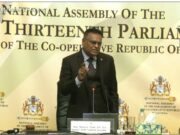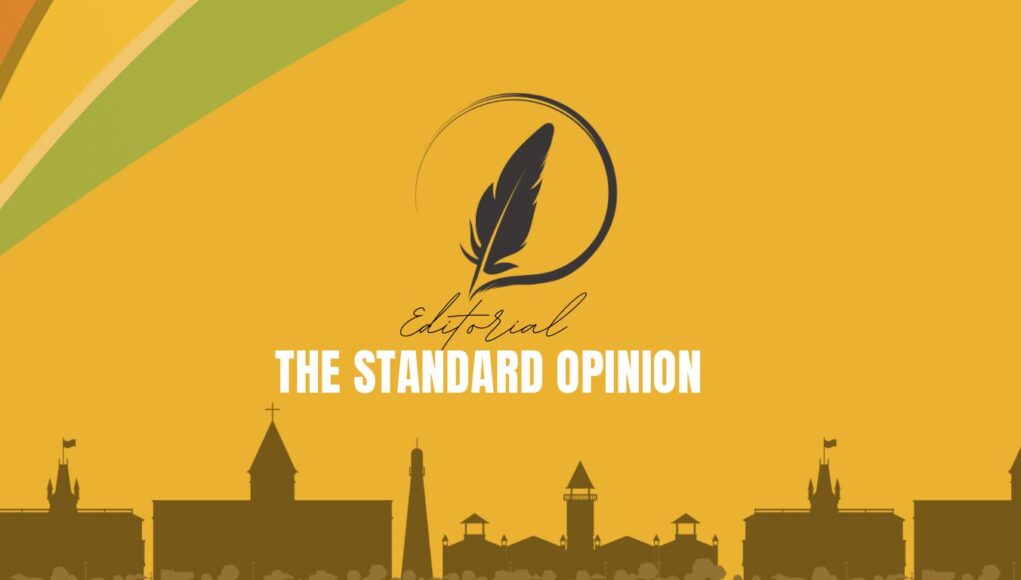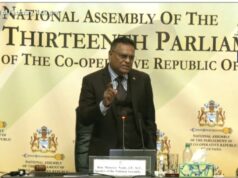What has the power to pit perception against reality? If you’re a fan of Naruto, you’re probably thinking, “Ahhh, this must be a Genjutsu”, but this isn’t about chakras or Shinobis, not that Masashi Kishimoto isn’t a genius. No, this is about something far more universal. It’s called irony.
Irony reminds us that there is only one true reality, and it illuminates the gap between what is perceived and what is real. So much so that it often intrigues the mind. This can trigger reflection or, in some cases, render us unable to process the outcome. When the latter occurs, we are either stunned into silence or reduced to hearty chuckles. Perhaps this is why situational irony has long been used to shape punchlines and plot twists alike.
The stench of swine at Garden of Eden on the East Bank of Demerara, the ruts and potholes riddling Best Road on the West Bank, a fake doctor turned cop, Kitty infested with rats, GPL’s slogan “Empowering you”, and Nigel Hughes condemning conflict of interest are more than absurdities. They are stark reminders that what we expect is often no match for what is.
One of the greatest tales of irony is found in the Mahabharata, a Hindu epic, attributed to the sage Vyasa. The Mahabharata tells the tale of a majestic war between two groups of royal cousins, the Pandavas and the Kauravas, for the throne of Hastinapura.
Among the central figures is Dronacharya, a formidable teacher of warfare, who had trained both sides but chose to fight for the Kauravas. Aside from his mastery of arms, Dronacharya was, as the scriptures note, the epitome of discipline and spiritual wisdom. At his side stood his son, Ashwatthama, but he was later deployed to another section of the battlefield, far from his father. On the battlefield, Dronacharya wreaked havoc. He was so skilled that even his most gifted student, Arjuna, the mighty warrior and spiritual son of the god Indra, could not defeat him.
The battle raged for days, and Dronacharya’s back never once touched the ground. But as mighty as he was, he harboured a secret: as long as he remained in a focused state of combat, he was indestructible. This state of mind is akin to being in the zone and as long as he was in this mode, he could not be killed, not by force nor by superior weapons. To defeat him, the Pandavas needed to strike not at his body, but at his spirit.
The plan would entail tricking Dronacharya into believing that his son, Ashwatthama, had been slain in battle. However, there was one among the Pandavas who could not lie. His name was Yudhishthira, and as the scriptures say, he was revered as the personification of truth.
The Pandava brothers were now faced with a dilemma.According to the epic, it was Shri Krishna, the divine strategist and Arjuna’s charioteer, who devised a plan to kill an elephant with the same name as Dronacharya’s son and announce its death. In this way, if Dronacharya sought confirmation from Yudhishthira, then the latter would not have to break his vow. Well, at least not technically.
“Ashwatthama is dead!” the mighty Dronacharya was told, but he did not believe. As was predicted, the warrior turned to Yudhishthira for the truth.
Yudhishthira replied, “Ashwatthama is dead…”, then, under his breath, added, “Ashwatthama, the elephant.” But Dronacharya did not hear the whisper. Believing that his son had died, he immediately lost the will to fight, and as a Brahmana, he dropped his weapons and resorted to meditation on the battlefield. He was subsequently beheaded.
The tale is riddled with irony: a man who upheld dharma with such devotion, who had lived his life by truth and discipline, was undone by a half-truth, uttered by the one man who had never spoken a lie. But more than that, Dronacharya, the man who taught the spiritual children of the Gods, including the mighty Bheem, was killed by someone considered a novice.
From the time of the spiritual warriors of ancient India to Kaliyog (now), irony still proves that it chooses no era, nor does it spare anyone. It continues to strip away the perception and reveal the nakedness of reality.
Following the September 2001 terrorist attack on the United States of America, U.S. President George Bush, delivered a televised address to a joint session of Congress and the American public. He officially launched the “War on Terror”.
The term was steeped in irony, both linguistically and in its practical application. How can you wage a war on terror? Isn’t War terror?
Here’s a striking recent example: Ahead of this year’s COP30 climate summit, Brazil, to accommodate over 50,000 attendees, including world leaders, decided to build a new four-lane highway cutting through tens of thousands of acres of protected Amazon rainforest near the host city of Belém.
Ironically, the very movement of people empowered to tackle climate crises is dependent on the destruction of one of the planet’s most vital ecosystems.
Let’s go local. Here’s one recent example that might have evaded the attention of Guyanese: the Kaieteur News’ Publisher, Glenn Lall, condemning the actions of the land’s watchdogs; lamenting their alleged abandonment of sacred duty and their unholy alliance with politicians and the elite.
But here’s the irony: the very man who condemns the media for kowtowing to the politicians and the wealthy businessmen owns a newspaper, commands significant business interests, and is actively vying for the presidency. How sincere can his call for media integrity be when he sits where business, politics, and journalism converge? But more importantly, how far removed is he from the very decay he condemns?
There is another example of irony that Guyanese might have also missed: Another businessman and founder of a political party, Dorwain Bess, professing he is not a politician, but his party has already released its 2025 election Manifesto, and he is a signatory to the merger with other political forces to vie for power.
Here’s another one: The Working Peoples Alliance (WPA), a small party yearning for a grand coalition and national political inclusivity, teams up with the A Partnership for National Unity (APNU), only to be left out of talks when the APNU and the Alliance for Change (AFC) met at the negotiation table. That’s rich – Azruddin Mohamed rich.
On the topic of Azruddin Mohamed, the governing People’s Progressive Party/Civic (PPP/C) says it is not bothered by the U.S.-sanctioned businessman’s move to contest the upcoming September 1, 2025, General and Regional Elections. He has been called a “novice”, yet the PPP seems to be expending a lot of time, energy and money to put a hole in its political rival’s sail.
Then there is the “Guyanese Critic” referring to others as “crooks”.
Don’t you just love irony?













